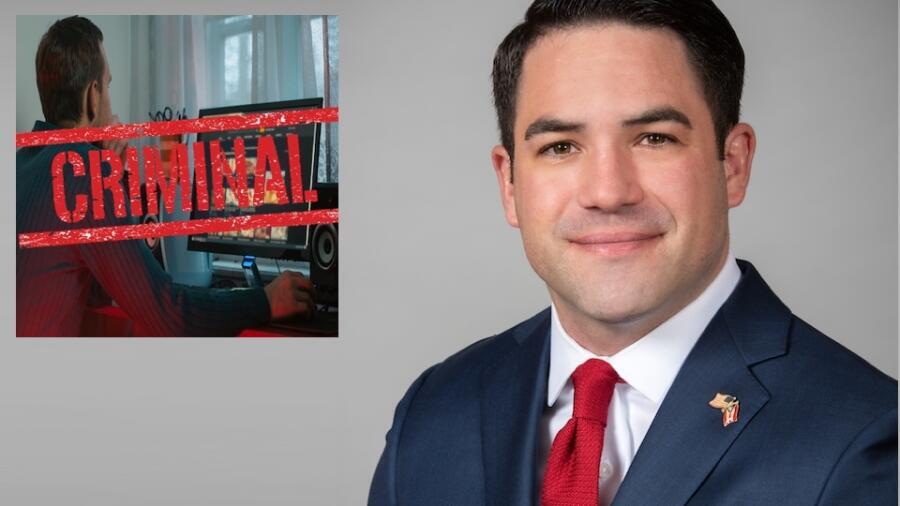
Ohio Republican’s ‘Innocence Act’ Could Criminalize Online Nudes
COLUMBUS, Ohio — A Republican lawmaker in Ohio introduced this week an age verification bill called the “Innocence Act,” which observers have pointed out that, as submitted, could criminalize the posting of any nude image online without verifying age as a felony.
According to a statement released by the author of Ohio’s proposed Innocence Act, State Rep.Steve Demetriou (R-Bainbridge Township), the stated goal of his House Bill 295 is to “require a more rigorous age verification process to prevent minors from viewing sexually explicit material on the internet in Ohio.”
According to Demetriou, the Ohio Innocence Act would “require any person in the state to verify their age prior to accessing pornographic websites and would make it illegal for anyone under the age of 18 to view sexually explicit content.”
Demetriou wrote he believes all online pornography “is a threat to Ohio children,” claiming that unspecified studies “have shown that pornography is a pathway to mental health issues for children and can be a precursor to sexual aggression.
“Additionally, it is no secret that the porn industry and human trafficking often overlap,” Demetriou added, citing a debunked, religiously-inspired anti-porn propaganda talking point.
The Innocence Act would allow the state to charge “pornography distributors” with a third-degree felony for “failing to verify the age of a person accessing the adult content.”
In another sentence, Demetriou’s official statement explains that “if a minor attempts to access sexually explicit material by falsifying their identity would be charged with a fourth-degree misdemeanor.”
The ungrammatically, bafflingly phrased sentence makes it unclear who would be charged with the misdemeanor, although it seems likely he is referring to the minor.
Other stipulations of Demetriou’s Innocence Act address the posting of sexually-themed deepfakes, which the legislator is proposing to be charged as a third-degree felony.
Ohio ‘Taking Age Verification One Step Further’
Following Demetriou’s announcement, Free Speech Coalition (FSC) Director of Public Affairs Mike Stabile posted on X.com, “A newly introduced Ohio bill takes age-verification campaign one step further — it effectively makes it a felony to post nudes. And teens that try to get around age-verification would be threatened with arrest.”
“Unlike other bills, which focus at least theoretically on adult sites, the ‘Innocence Act’ applies to everything on the internet — though, as usual, definitions are vague and confusing,” Stabile added.
What gives Demetriou’s poorly worded Innocence Act the potential to criminalize any online nude is that it gives broad leeway to politically and religiously motivated prosecutors to charge persons or companies online for posting “material harmful to juveniles.”
According to Ohio’s current statute penalizing sex offenses (2907.01, last updated in 2004), “harmful to juveniles” is defined as “any material or performance describing or representing nudity, sexual conduct, sexual excitement or sado-masochistic abuse in any form to which all of the following apply: (1) The material or performance, when considered as a whole, appeals to the prurient interest of juveniles in sex; (2) The material or performance is patently offensive to prevailing standards in the adult community as a whole with respect to what is suitable for juveniles; (3) The material or performance, when considered as a whole, lacks serious literary, artistic, political, and scientific value for juveniles.”
By creating this explicit criminal liability, the Ohio Innocence Act would encourage state actors to police free speech around sexual matters they do not approve of — currently, for example, any LGBT+ content in several GOP-majority states — under the guise of eradicating “online harms.”
Demtriou’s proposal states that “no organization who sells, delivers, furnishes, disseminates, provides, exhibits, or presents any material or performance that is obscene or harmful to juveniles on the
internet shall recklessly fail to verify that any person attempting to access the material or performance that is obscene or harmful to juveniles is eighteen years of age or older through reasonable age verification methods.”
The act then considers whoever is found in violation of that section to be “guilty of failure to verify age of person accessing materials that are obscene or harmful to juveniles, a felony of the third degree.”
The confusing “no organization” language may or may not exempt individuals, but it certainly appears to create liability for any platform or website that would allow any nudity to be posted by themselves or its users, and also for any third-party company, group or non-profit that may post nudity anywhere without first signing up for costly age-verification solutions.
